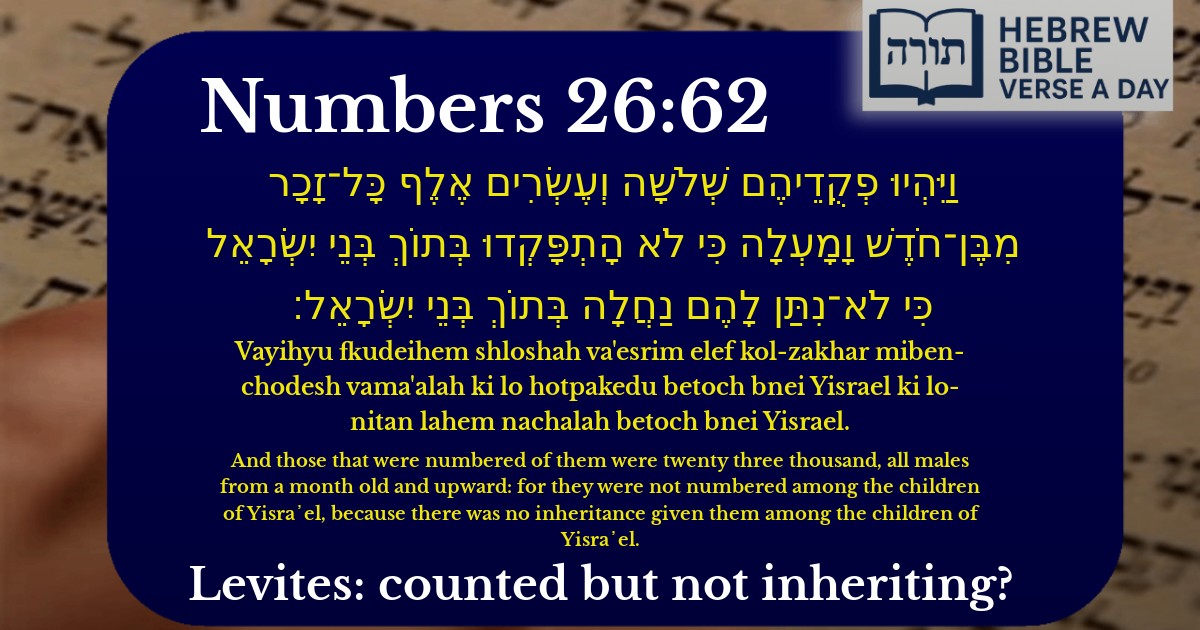Join Our Newsletter To Be Informed When New Videos Are Posted
Join the thousands of fellow Studends who rely on our videos to learn how to read the bible in Hebrew for free!
Hebrew Text
וַיִּהְיוּ פְקֻדֵיהֶם שְׁלֹשָׁה וְעֶשְׂרִים אֶלֶף כָּל־זָכָר מִבֶּן־חֹדֶשׁ וָמָעְלָה כִּי לֹא הָתְפָּקְדוּ בְּתוֹךְ בְּנֵי יִשְׂרָאֵל כִּי לֹא־נִתַּן לָהֶם נַחֲלָה בְּתוֹךְ בְּנֵי יִשְׂרָאֵל׃
English Translation
And those that were numbered of them were twenty three thousand, all males from a month old and upward: for they were not numbered among the children of Yisra᾽el, because there was no inheritance given them among the children of Yisra᾽el.
Transliteration
Vayihyu fkudeihem shloshah va'esrim elef kol-zakhar miben-chodesh vama'alah ki lo hotpakedu betoch bnei Yisrael ki lo-nitan lahem nachalah betoch bnei Yisrael.
Hebrew Leining Text
וַיִּהְי֣וּ פְקֻדֵיהֶ֗ם שְׁלֹשָׁ֤ה וְעֶשְׂרִים֙ אֶ֔לֶף כׇּל־זָכָ֖ר מִבֶּן־חֹ֣דֶשׁ וָמָ֑עְלָה כִּ֣י <b>׀</b> לֹ֣א הׇתְפָּקְד֗וּ בְּתוֹךְ֙ בְּנֵ֣י יִשְׂרָאֵ֔ל כִּ֠י לֹא־נִתַּ֤ן לָהֶם֙ נַחֲלָ֔ה בְּת֖וֹךְ בְּנֵ֥י יִשְׂרָאֵֽל׃
וַיִּהְי֣וּ פְקֻדֵיהֶ֗ם שְׁלֹשָׁ֤ה וְעֶשְׂרִים֙ אֶ֔לֶף כׇּל־זָכָ֖ר מִבֶּן־חֹ֣דֶשׁ וָמָ֑עְלָה כִּ֣י ׀ לֹ֣א הׇתְפָּקְד֗וּ בְּתוֹךְ֙ בְּנֵ֣י יִשְׂרָאֵ֔ל כִּ֠י לֹא־נִתַּ֤ן לָהֶם֙ נַחֲלָ֔ה בְּת֖וֹךְ בְּנֵ֥י יִשְׂרָאֵֽל׃
🎵 Listen to leining
Parasha Commentary
📚 Talmud Citations
This verse is not quoted in the Talmud.


Context of the Verse
The verse (Bamidbar 3:39) discusses the census of the tribe of Levi, which totaled 23,000 males from one month old and upward. Unlike the other tribes of Israel, the Levites were not included in the general census of Bnei Yisrael, as they were designated for sacred service in the Mishkan and later the Beit HaMikdash.
Exclusion from the General Census
Rashi explains that the Levites were not counted among Bnei Yisrael because they were set apart for divine service. The phrase "כִּי לֹא הָתְפָּקְדוּ בְּתוֹךְ בְּנֵי יִשְׂרָאֵל" ("for they were not numbered among the children of Israel") emphasizes their unique role. The Ramban adds that since the Levites were not to receive a territorial inheritance in Eretz Yisrael, they were counted separately to highlight their distinct spiritual mission.
Counting from One Month Old
The Talmud (Chullin 24a) notes that the Levites were counted from the age of one month, unlike the other tribes, which were counted from twenty years old (Bamidbar 1:3). The Midrash (Bamidbar Rabbah 3:6) explains that this early counting signifies the sanctity of the Levites from infancy, as they were destined for holy service.
No Inheritance Among Bnei Yisrael
The verse concludes with the reason for their separate census: "כִּי לֹא־נִתַּן לָהֶם נַחֲלָה בְּתוֹךְ בְּנֵי יִשְׂרָאֵל" ("because there was no inheritance given them among the children of Israel"). The Sforno elaborates that since their sustenance came from tithes and offerings rather than land, their census reflected their dependence on Hashem and their role as spiritual leaders rather than landowners.
Spiritual Role of the Levites